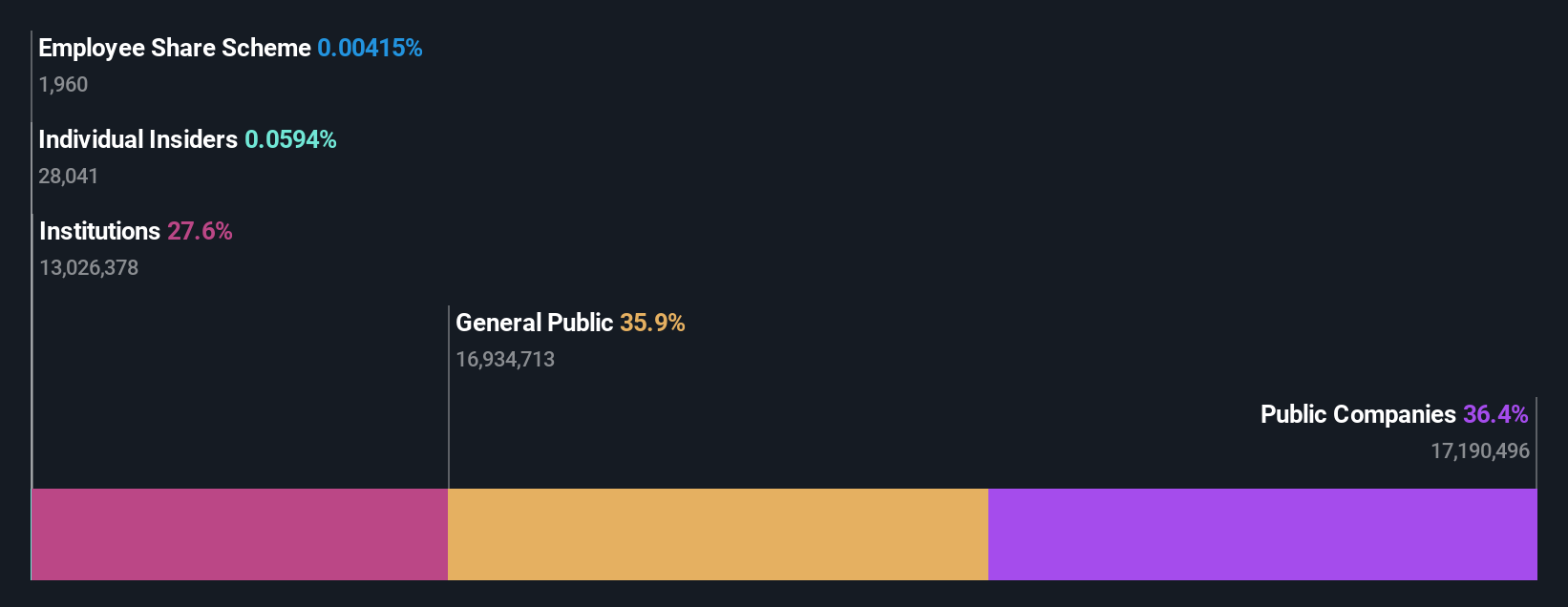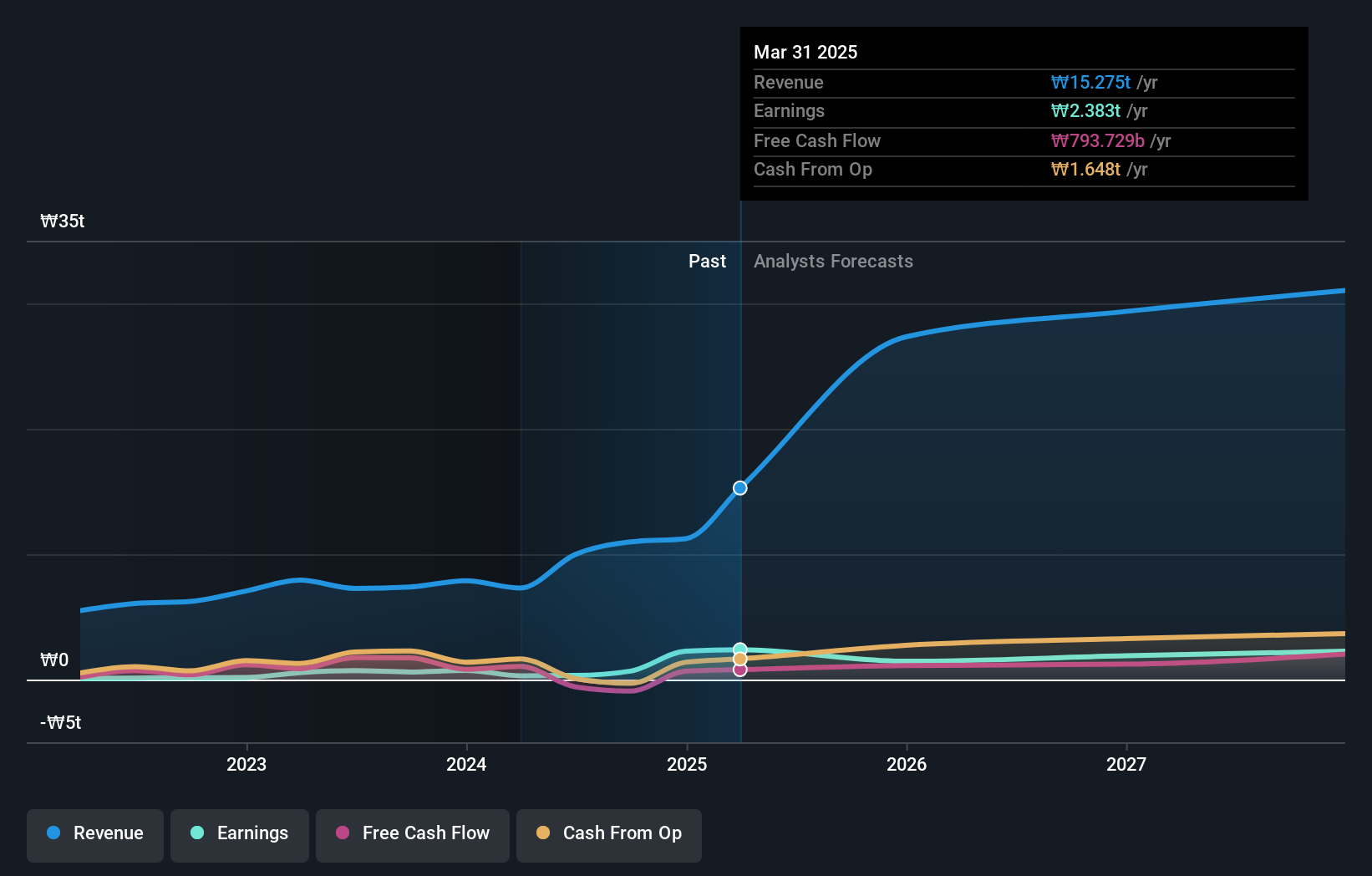- South Korea
- /
- Aerospace & Defense
- /
- KOSE:A012450
Individual investors own 36% of Hanwha Aerospace Co., Ltd. (KRX:012450) shares but public companies control 36% of the company

Key Insights
- The considerable ownership by public companies in Hanwha Aerospace indicates that they collectively have a greater say in management and business strategy
- A total of 5 investors have a majority stake in the company with 52% ownership
- Institutions own 28% of Hanwha Aerospace
If you want to know who really controls Hanwha Aerospace Co., Ltd. (KRX:012450), then you'll have to look at the makeup of its share registry. We can see that public companies own the lion's share in the company with 36% ownership. Put another way, the group faces the maximum upside potential (or downside risk).
Meanwhile, individual investors make up 36% of the company’s shareholders.
Let's delve deeper into each type of owner of Hanwha Aerospace, beginning with the chart below.
View our latest analysis for Hanwha Aerospace

What Does The Institutional Ownership Tell Us About Hanwha Aerospace?
Institutional investors commonly compare their own returns to the returns of a commonly followed index. So they generally do consider buying larger companies that are included in the relevant benchmark index.
We can see that Hanwha Aerospace does have institutional investors; and they hold a good portion of the company's stock. This implies the analysts working for those institutions have looked at the stock and they like it. But just like anyone else, they could be wrong. If multiple institutions change their view on a stock at the same time, you could see the share price drop fast. It's therefore worth looking at Hanwha Aerospace's earnings history below. Of course, the future is what really matters.

Hedge funds don't have many shares in Hanwha Aerospace. Looking at our data, we can see that the largest shareholder is Hanwha Corporation with 36% of shares outstanding. In comparison, the second and third largest shareholders hold about 7.2% and 3.7% of the stock.
To make our study more interesting, we found that the top 5 shareholders control more than half of the company which implies that this group has considerable sway over the company's decision-making.
While studying institutional ownership for a company can add value to your research, it is also a good practice to research analyst recommendations to get a deeper understand of a stock's expected performance. There are plenty of analysts covering the stock, so it might be worth seeing what they are forecasting, too.
Insider Ownership Of Hanwha Aerospace
The definition of company insiders can be subjective and does vary between jurisdictions. Our data reflects individual insiders, capturing board members at the very least. Management ultimately answers to the board. However, it is not uncommon for managers to be executive board members, especially if they are a founder or the CEO.
Most consider insider ownership a positive because it can indicate the board is well aligned with other shareholders. However, on some occasions too much power is concentrated within this group.
Our information suggests that Hanwha Aerospace Co., Ltd. insiders own under 1% of the company. It is a very large company, so it would be surprising to see insiders own a large proportion of the company. Though their holding amounts to less than 1%, we can see that board members collectively own ₩23b worth of shares (at current prices). In this sort of situation, it can be more interesting to see if those insiders have been buying or selling.
General Public Ownership
The general public, who are usually individual investors, hold a 36% stake in Hanwha Aerospace. This size of ownership, while considerable, may not be enough to change company policy if the decision is not in sync with other large shareholders.
Public Company Ownership
It appears to us that public companies own 36% of Hanwha Aerospace. This may be a strategic interest and the two companies may have related business interests. It could be that they have de-merged. This holding is probably worth investigating further.

Next Steps:
While it is well worth considering the different groups that own a company, there are other factors that are even more important. Take risks for example - Hanwha Aerospace has 3 warning signs (and 2 which can't be ignored) we think you should know about.
But ultimately it is the future, not the past, that will determine how well the owners of this business will do. Therefore we think it advisable to take a look at this free report showing whether analysts are predicting a brighter future.
NB: Figures in this article are calculated using data from the last twelve months, which refer to the 12-month period ending on the last date of the month the financial statement is dated. This may not be consistent with full year annual report figures.
Valuation is complex, but we're here to simplify it.
Discover if Hanwha Aerospace might be undervalued or overvalued with our detailed analysis, featuring fair value estimates, potential risks, dividends, insider trades, and its financial condition.
Access Free AnalysisHave feedback on this article? Concerned about the content? Get in touch with us directly. Alternatively, email editorial-team (at) simplywallst.com.
This article by Simply Wall St is general in nature. We provide commentary based on historical data and analyst forecasts only using an unbiased methodology and our articles are not intended to be financial advice. It does not constitute a recommendation to buy or sell any stock, and does not take account of your objectives, or your financial situation. We aim to bring you long-term focused analysis driven by fundamental data. Note that our analysis may not factor in the latest price-sensitive company announcements or qualitative material. Simply Wall St has no position in any stocks mentioned.
About KOSE:A012450
Hanwha Aerospace
Engages in the development, production, and maintenance of aircraft engines worldwide.
Solid track record and good value.
Market Insights
Community Narratives



